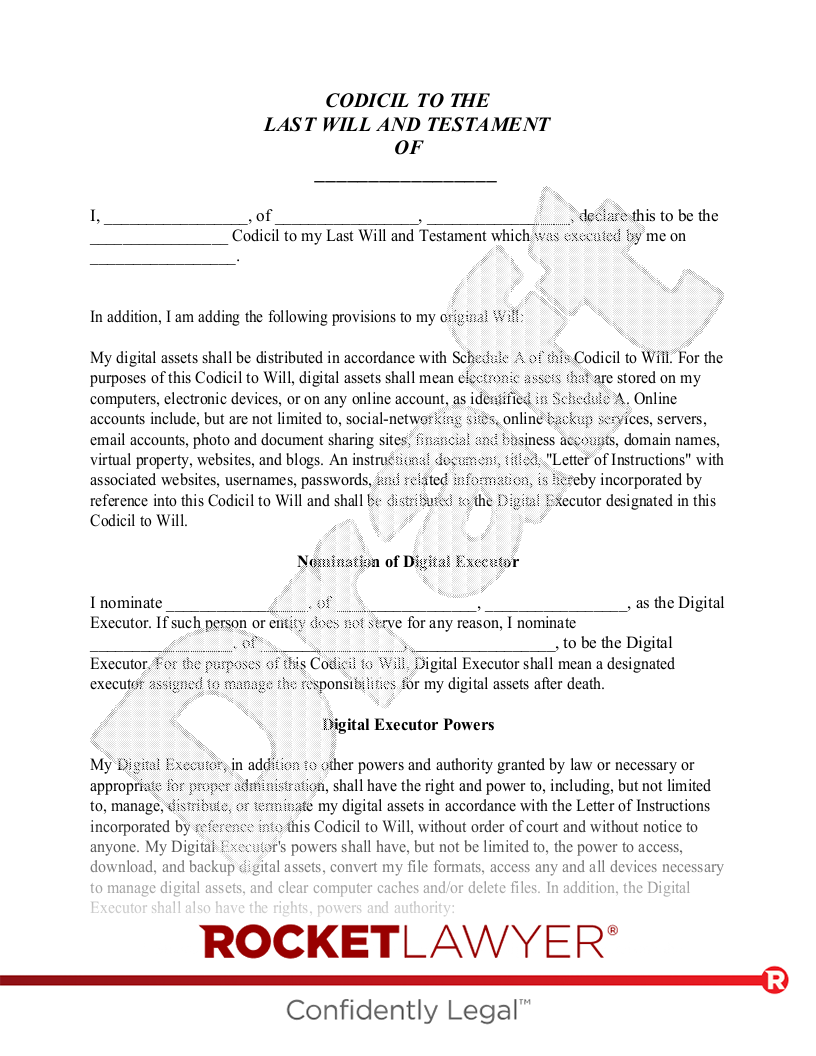Can I update my Last Will and Testament without making a new one?
Once you have gone through the process of making and executing a Last Will and Testament, you understandably want to avoid the need to go through the process again, if possible. At the same time, life events may make it necessary to update parts of your Will. For example, the person you named as your executor may pass away, creating the need to name a replacement executor or you may decide to change how your assets are distributed in your Will, calling for a much more complex update to your Will.
The good news is that it is possible to update your Last Will and Testament without making a new Will: Simply add a Codicil to your existing Will. This option, however, is primarily intended for scenarios where you only have to make a few relatively minor changes.
A Codicil is a legal document that references your existing Will and details the changes you wish to make to that Will. For example, you might reference your original Will and state that you want to change the executor from John Smith to Mary Brown. The same formalities of execution are required when signing a Codicil as those when signing your Will. Typically, this means you are required to sign the Codicil in front of witnesses. Once the Codicil has been properly executed, you simply attach the Codicil to your original Will to complete your update.
While a Codicil works fine when the goal is a minor change or update, it is not intended for more complex changes. Likewise, if you have already used a Codicil to make several minor changes and more changes are necessary, it might be time to forgo the Codicil route and make a new Will to avoid confusion.
What is the easiest way to add or change beneficiaries to my Will?
The primary purpose of a Will is to ensure that your estate assets are passed down to the beneficiaries of your choosing after you pass away. You may find, however, that changes to your named beneficiaries are necessary at some point after your Will is in place. The birth of a grandchild, for example, might prompt you to add that grandchild as a beneficiary in your Will. Conversely, the death of a beneficiary named in your Will could necessitate removing that beneficiary from your Will.
If your aim is to add, delete, or replace a beneficiary in your Will, a Codicil can accomplish this easily and quickly. If the change in beneficiaries leads to more complicated changes involving the distribution of assets in your Will, you might want to consider revoking your existing Will and making a new one.
Does a new Will automatically revoke my old Will?
Wills, Trusts, and estates are governed by state law, meaning the laws governing the automatic revocation of a Will may vary from one state to the next. As a general rule, the proper execution of a new Will serves to invalidate an existing Will. To make sure the intent of the testator (the person making the Will) is clear, it is always best to include a statement at the beginning of a Last Will and Testament stating that all previous Wills are hereby revoked. This statement also helps avoid probate litigation after you are gone because it eliminates confusion over which Will you intended to be your Last Will and Testament.
How do I update my Will after moving to a new state?
If you move to a new state, it is always wise to make a new Will and execute that Will using the proper procedures required in that state to guarantee your Last Will and Testament is valid. Although a valid Will executed in one state usually remains valid in another state, there are frequently different execution requirements or state laws that can impact the terms of your Will. Once you become a resident of a new state, the laws of that state govern your Will, including the gifts made in your Will and the probate of your estate after you pass away. For this reason, a Codicil is not the best option in this scenario. To be certain that your Will remains valid, and that any changes in state law are reflected in your Will, revoking your existing Will and making a new one is the best option when you move to a new state.
If you wish to make changes to your Will, whether by creating a Codicil or by revoking your current Will and making a new one, Rocket Lawyer makes it easy to create estate planning documents online. You can also reach out to a Rocket Lawyer network attorney for affordable answers to your estate planning questions.
This article contains general legal information and does not contain legal advice. Rocket Lawyer is not a law firm or a substitute for an attorney or law firm. The law is complex and changes often. For legal advice, please ask a lawyer.
